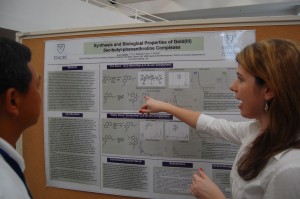This year’s Emory’s Summer Undergraduate Research Experience program is the largest it has ever been. Thursday’s poster session at the Dobbs University Center was split into two shifts so that all 99 participants could have a chance to explain their research. Graduate students in Emory’s Division of Biological and Biomedical Sciences circulated through the crowd, taking notes in order to judge the posters. The majority of participating students worked in biomedical research labs in the Woodruff Health Sciences Center.

Oxford College chemistry major Ashley Hodges explains her work on new potential anti-cancer agents to radiologist Hui Mao
SURE, organized by Emory’s Center for Science Education, is a ten-week program, attracting undergraduates not only from Emory but from other Atlanta-area universities and around the world.
Participants receive a stipend and on-campus housing, and have weekly meetings on ethics, research careers and lab life. About a third of former participants complete a graduate degree, according to follow-up surveys recently published in the journal Life Sciences Education. The main funding comes from Howard Hughes Medical Institute, with additional support from the National Science Foundation, National Institutes of Health and a variety of non-profit foundations.






